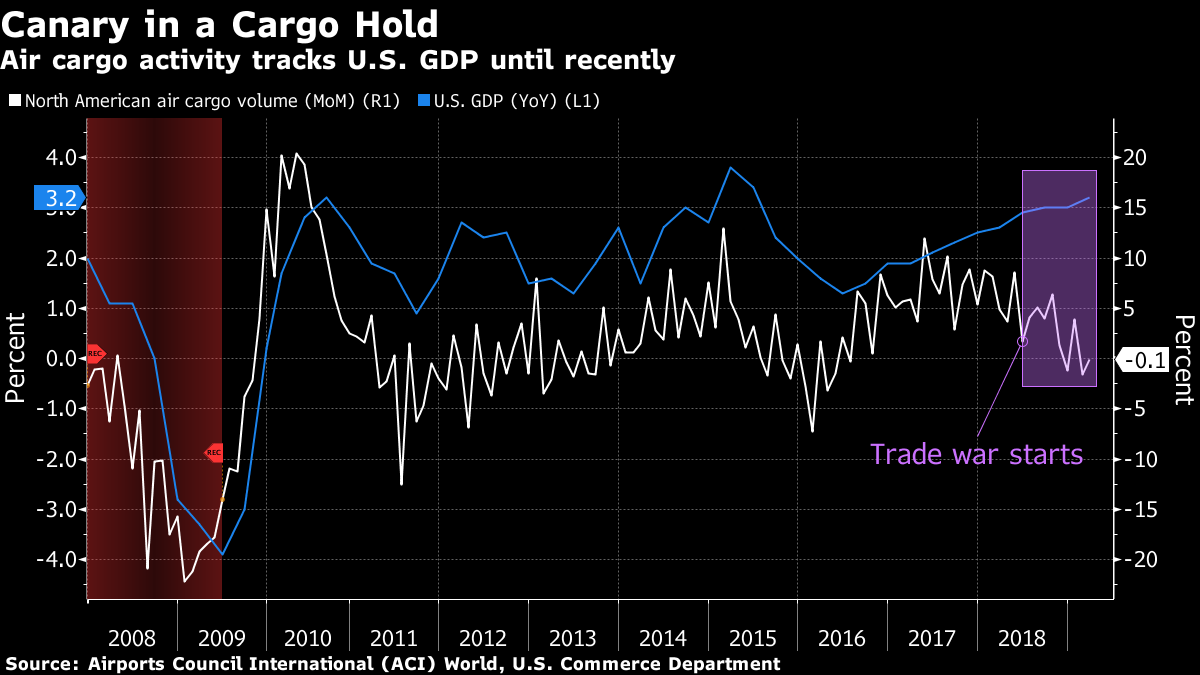No products in the cart.
Air cargo carriers are caught in crossfire of Trump-China trade war

Donald Trump’s intensifying trade war with China dented air cargo traffic even before FedEx Corp. got dragged into the brawl, as companies worldwide reconfigure their supply chains in the face of increasing tariffs.
Global cargo demand fell 4.7% in April from a year earlier, according to the International Air Transport Association, equaling a February drop that was the worst in three years, with the biggest declines coming from manufacturing hubs in Asia and Europe. Freight operators are bracing for more disruption as tensions between Washington and Beijing ratchet up, and trade experts warn that declining shipments – worsened by Brexit jitters and simmering tensions in the Middle East – indicate a slowdown in global growth.
“If we see a further deterioration and tariff increases, there will be further damage to world trade,” IATA director general Alexandre de Juniac said on a conference call. “It will clearly be a difficult year for world cargo.”
The U.S. in May raised tariffs on $200 billion of Chinese exports and blacklisted Huawei Technologies Co. After Trump said duties on Chinese goods “could go up very, very substantially,” China accused the U.S. of seeking an “unequal trade deal” and said it would draw up a list of “unreliable entities” that could be targeted for retaliation.
On Saturday, China said it would probe FedEx, after some Huawei packages were reportedly diverted to the U.S. without authorization.
Read more: China Targets FedEx in ‘Warning’ to U.S. as Trade War Widens
Evidence of impact from the escalations is piling up. Chinese industrial output, retail sales, and investment all slowed in April by more than economists forecast. In the U.S., retail sales unexpectedly declined in April while factory production fell for the third time in four months. In Germany, business confidence tumbled to the lowest level in four years in May.
Goods valued at $6 trillion are exported by aircraft each year, according to IATA, accounting for 35% of the value of world trade. Air freight companies have already seen revenue fall due to declining shipments of high-tech goods such as semiconductor chips and products used in just-in-time manufacturing.
United Parcel Service Inc. says weakness on U.S.-China trade routes lowered revenue in the first quarter. Korean Air Lines Co. attributes a “drastic” drop in cargo to trade fears. Data from German airport operators and Deutsche Lufthansa AG show freight volumes weakening this year, and the carrier said it would trim cargo flights to protect profitability. Pieter Elbers, head of the Dutch arm of Air France-KLM, said Sunday its cargo declines were roughly tracking the industry’s.
Decreases in air shipments can herald broader industrial slowdowns, as they did in 2008, according to Robert Mayer, who studies the cargo business at the Centre for Air Transport Management at England’s Cranfield University. While it’s faster than land or ocean freight, air cargo is also more expensive — and therefore less useful during a recession, according to IATA, while in a recovery companies may pay extra to replenish inventories more quickly.
Advanced Micro Devices Inc., Micron Technology Inc. and Nvidia Corp. have all reported slowing shipments of semiconductors. The declines have been aggravated by Washington’s blacklisting of Huawei, a top purchaser of chips. Samsung Electronics Co., the world’s largest chipmaker, called out tepid demand for memory chips and displays, two key air-cargo items.
Trump, citing national security concerns, also signed an executive order to restrict U.S. imports of equipment from Huawei and ZTE Corp. Huawei was further blacklisted by the Department of Commerce from doing business with U.S. firms, though later was given 90 days before the ban takes effect. The restrictions would further cut the flow of goods from Asia to the west, airlines say.
“There will be a fallout on cargo as we go through the year,” Tim Clark, president of Gulf long-haul airline Emirates, said in an interview at IATA’s annual gathering in Seoul Sunday. “If it worsens and there is a lot of posturing aero-politically, which is possibly a result of the trade war, that could see an effect on trans-Pacific demand and to an extent European-Asian demand.”
Even as they grapple with U.S.-China tensions, cargo carriers face a host of other concerns that could spell trouble. Britain’s exit from the European Union has pushed some companies to shift or slow production and stockpile goods. Economic turbulence in Turkey and tensions in Iran have cut into regional trade. Asian carriers say failed harvests in the U.S. have reduced air shipments of high-value foods that have become a growing part of their business.
As the tariff war grinds on, companies are revamping operations in ways that threaten to permanently shift trade flows. Shoemaker Crocs Inc. says it’s building up inventory at a new distribution center in Ohio after boosting air shipments to meet demand for its plastic clogs in the first quarter. Ralph Lauren said it’s shouldering higher inventories to reduce the use of air freight.
“Freight export volumes from China may not recover to their pre-tariff levels,” Cowen & Co. analyst Jason Seidl said in a May 8 report. “Many shippers have adjusted their supply chains to source goods from South Asia, South America, Mexico, and Canada or the U.S.”
And even if the U.S.-China conflict calms, carriers with a big presence in Europe and Japan fret that Trump would then turn his fire on automakers like Volkswagen AG and Toyota Motor Corp., hitting shipments of lightweight, air-transportable parts. Use of air freight has increased in the industry as cars add digital components, some of which must be flown because they could be damaged if they travel by sea.
“We are concerned that the U.S.-China trade war is going to affect everybody,” Akbar Al Baker, CEO of Qatar Airways, said in Seoul. “It’s not only going to affect the two countries. Both are such economic powers that whatever they do, it will affect the rest of the economies of the world.”

















